Grass Fed Protein Market Research, 2031
The global grass fed protein market size was valued at $122.8 million in 2021, and is projected to reach $280.6 million by 2031, growing at a CAGR of 8.7% from 2022 to 2031.
Grass fed protein is extracted in the process of making cheese from milk obtained from animals that only consume grass on farm. Since farming in this sector is done without the use of chemicals or pesticides, it takes more time and effort than traditional farming which results in premium products. Since farming in this market is done without the use of chemicals or pesticides, it takes more time and efforts than traditional farming which results in premium products.
Moreover, grass fed protein is rich source of antioxidants, which help to protect the cardiovascular system by lowering cholesterol levels. It further lowers the risk of stroke and coronary heart disease. As a result of these advantages, the popularity of grass fed protein is growing. Increase in use of grass fed protein in the pharmaceuticals and food & beverages industries is driving up the grass fed protein market demand.
Most individuals now consume more fast food because it is quick, easy, and reasonably priced to sate their hunger due to busy lifestyles that have disrupted appropriate mealtime and good diet. As a result, getting enough protein is neglected, which can lead to tiredness, weight gain, and other chronic diseases from eating the wrong foods or eating incorrect meals. Over a billion individuals worldwide are suffering from insufficient protein intake, according to healthline.com. Manufacturers of grass-fed products have several chances in this market to launch new goods in order to address issues like affordability. Due to several reasons including poverty and poor income that cause protein insufficiency, about 30% of children in areas like Central Africa and South Asia have restricted access to protein in their diet. Therefore, there is a chance for Grass fed protein market growth in these areas while also meeting the local market's protein needs.
Global dietary trends have changed, according to the World Health Organization (WHO), as a result of increased urbanisation, an increase in the manufacture of processed foods, and changing lifestyles. Additionally, consuming dairy protein—including products made from grass—helps maintain and increase lean muscle mass, which is one of the key drivers of the high demand for grass fed protein. Additionally, it supports the preservation of tooth and bone health. The preservation of a healthy weight, blood pressure, and heart are other health advantages of grass-fed dairy protein. Additionally, the expansion of grass-fed protein products is facilitated by the availability of protein goods in the market through a variety of channels, including hypermarket/supermarket, specialty shops, and online sales channels and create various scope for grass fed protein market opportunity
Additionally, as developing nations become more aware of the benefits of items like grass-fed protein, the consumption of this food in developed nations tends to rise as well. The market for grass-fed protein is expanding thanks to wealthy industrialised nations' high purchasing power. As a result, one of the main factors driving the demand for grass-fed protein in developing nations is public knowledge of it. Few developing nations, like the U.S., Canada, the United Kingdom, Germany, France, and Italy, have populations with higher income levels and a preference for high-end goods like grass-fed proteins. Countries like Somalia, Mali, and South Sudan spend a large portion of their income on basic consumables like bread and cereal.
Overconsumption of protein is one of the major restraints in the grass fed protein market. Limited information on protein intake among population across the globe leads to extra intake of protein which negatively impacts the health of the consumers. Abnormal heart rhythms, change in cholesterol levels, headache, increase in diabetes risk, increase in fracture or osteoporosis risk, kidney dysfunction as well as degrading bone health are some of the consequences of over consuming grass fed protein.
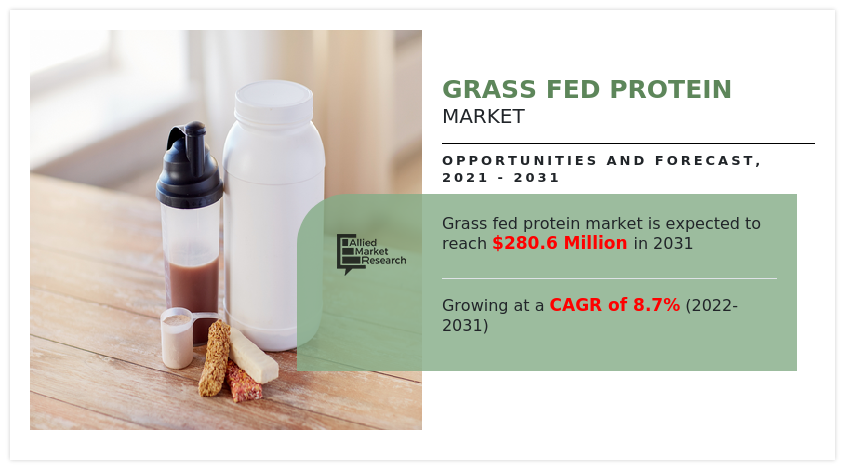
The global grass fed protein industry is segmented on the basis of product type, flavor, distribution channel, and region. On the basis of product type, the market is categorized into powder, shakes & drinks, bars, and others. According to flavor, it is fragmented into chocolate, vanilla, and others. As per distribution channel, it is divided into hypermarket/supermarket, online sales channel, and specialty stores. Region wise, it is analyzed across North America (the U.S., Canada, and Mexico), Europe (Germany, France, the UK, Spain, Italy, Belgium, the Netherlands and rest of Europe), Asia-Pacific (China, Japan, India, South Korea, Australia, New Zealand, and rest of Asia-Pacific), and LAMEA (Brazil, South Africa, Argentina, UAE and the rest of LAMEA).
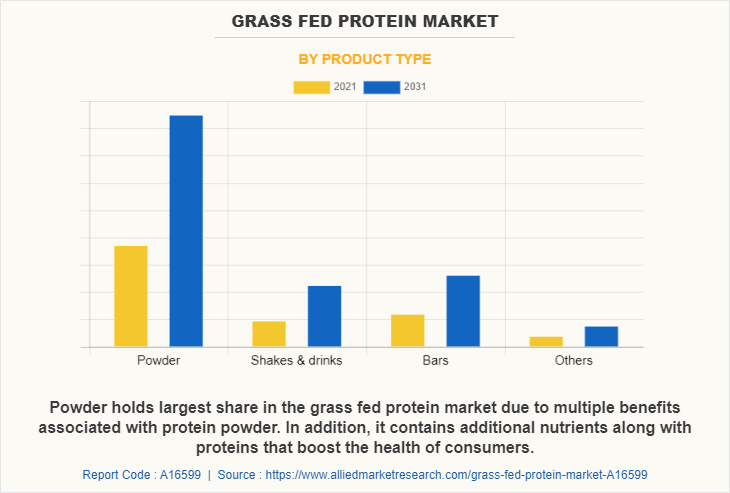
By product type, the powder segment was the highest revenue contributor in 2021, and is expected to register a CAGR of 8.8%. In addition, powder is widely available among almost all distribution channels in the market. It is widely preferred by gym goers and sportsperson as it aids in providing instant energy for intensive activities.
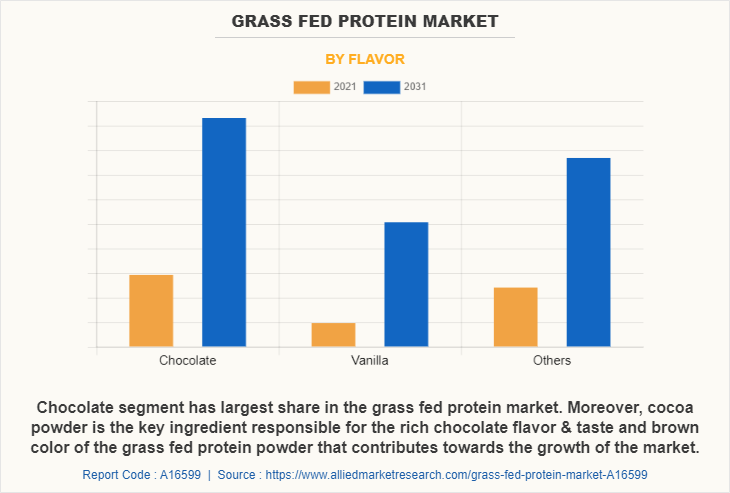
On the basis of flavor, the chocolate segment was the highest revenue contributor in 2021 valued $49,340.6 thousand and is expected to reach $113,029.0 thousand by 2031 at a CAGR of 8.7%. This is due to exquisite taste of chocolate which increases its popularity among consumers, thereby contributing toward its largest share in the market and expected significant growth in grass fed protein market forecast period.
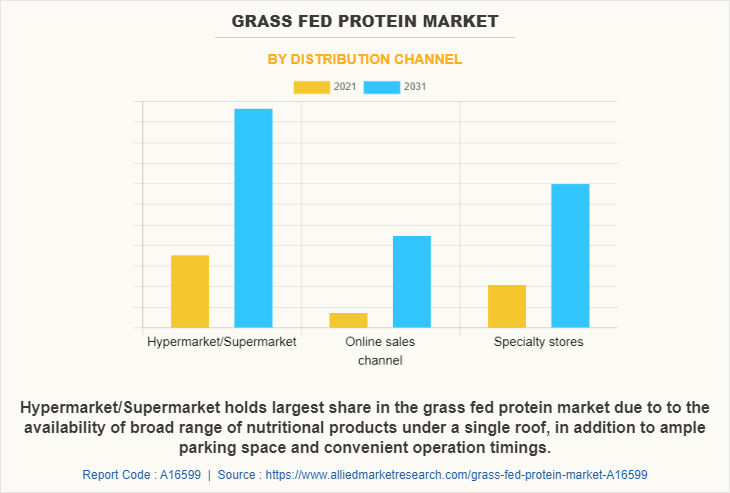
Based on distribution channel, the grass fed protein market share for hypermarket/supermarket was largest in 2021, and is expected to continue the same due to huge varieties of grass fed protein products offered at a particular place. In addition, availability of products in hypermarket/supermarket situated near residential area is contributing toward the segmental growth during the forecast period.
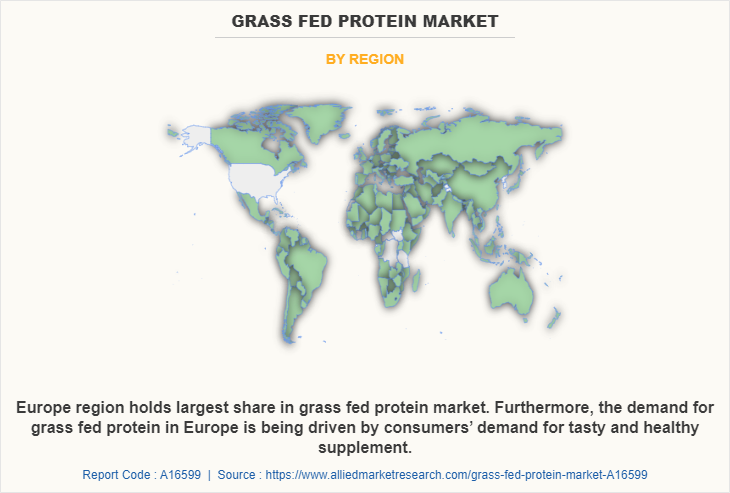
As per region, the grass fed protein market size for Europe was largest in 2021 due to growing preference towards grass fed protein across the region. Demand for grass fed protein from the countries such as France, Germany, and the UK is driving the market growth. Growth in urban population combined with rise in disposable income and living standards, is expected to contribute to overall market growth.
The market is being driven by factors such as rapid growth in the food & beverages as well as dairy industries in developing countries and increase in awareness related to the benefits of grass fed protein. The major players operating in the global grass fed protein industry are Gnarly Nutrition, MusclePharm, Naked Nutrition, Organic Valley, Promix Nutrition, NutraBio Labs, Now foods, Fonterra, Arla Food Ingredients, and Kerry.
Key Benefits For Stakeholders
- This report provides a quantitative analysis of the market segments, current trends, estimations, and dynamics of the grass fed protein market analysis from 2021 to 2031 to identify the prevailing grass fed protein market opportunities.
- The market research is offered along with information related to key drivers, restraints, and opportunities.
- Porter's five forces analysis highlights the potency of buyers and suppliers to enable stakeholders make profit-oriented business decisions and strengthen their supplier-buyer network.
- In-depth analysis of the grass fed protein market segmentation assists to determine the prevailing market opportunities.
- Major countries in each region are mapped according to their revenue contribution to the global market.
- Market player positioning facilitates benchmarking and provides a clear understanding of the present position of the market players.
- The report includes the analysis of the regional as well as global grass fed protein market trends, key players, market segments, application areas, and market growth strategies.
Grass fed Protein Market Report Highlights
| Aspects | Details |
| Market Size By 2031 | USD 280.6 million |
| Growth Rate | CAGR of 8.7% |
| Forecast period | 2021 - 2031 |
| Report Pages | 330 |
| By Product type |
|
| By Flavor |
|
| By Distribution channel |
|
| By Region |
|
| Key Market Players | nutrabio labs, inc., Garnly Nutrition, MusclePharm, kerry group, arla foods ingredients, fonterra, Now foods, Naked Nutrition, Organic valley, Promix nutrition |
Analyst Review
According to the insights of CXOs of leading companies, the rapid expansion of the food & beverages industry combined with the multiple application of protein is helping to drive the demand for grass fed protein globally. Grass fed protein nutritional characteristics aid in relieving depression and anxiety as well as promote brain health. Further, owing to increase in disposable income, consumer expenditure on health supplement products has simultaneously increased. This resulted in increase in demand for grass fed which is anticipated to augment the market growth during the forecast period.
Owing to growing health consciousness of consumers, they prefer natural-based products over synthetic based ones, which is expected to raise the demand for grass fed protein throughout the forecast period. In addition, grass fed protein is widely used in anti-inflammatory products as it contains omega-3 fatty acid, vitamin E and CLA, which contribute to the growth of grass fed protein market. Economical prices of grass fed protein aid in the huge production of meat & dairy products, which is projected to drive up the demand for grass fed protein in the market throughout the forecast period.
Europe held the largest share in 2021 due to rise in preference of European population toward healthy products. In addition, government of a few countries such as Germany and France in this region provides subsidies to promote grass fed farming. Furthermore, growth in urban population, combined with rise in disposable income & living standards, is expected to contribute to the overall market growth.
The major players operating in the global grass fed protein market are Gnarly Nutrition, MusclePharm, Naked Nutrition, Organic Valley, Promix nutrition, NutraBio Labs, Now foods, Fonterra, Arla Food Ingredients, and Kerry.
Germany and U.S. have enormous market in the Grass fed protein market. This is attributed to the huge number of players in the region offering wide range of products at lucrative prices as well as purchasing power of population in this countries contributing in the growth.
Rising health concerns and people across the globe are shifting toward healthy products are few upcoming trends of grass fed protein market. Thus, health benefits of grass fed protein facilitate the growth of the grass fed protein market.
Grass fed protein widely used in food & beverage industry due to nutritional benefits such as higher omega-3 fatty acids that aid in improving heart health and reducing inflammation
The global grass fed protein market size was valued at $122,745.6 thousand in 2021, and is projected to reach $280,574.9 thousand by 2031, registering a CAGR of 8.7%.
India, China, France, and Australia are lucrative markets for probiotic drinks, growing at a CAGR of 10.7%, 10.3%, 9.6%, and 10.0%, respectively, during the forecast period.
Grass fed protein powder segment is the most influencing sub segment growing in the product type. This is attributed to the fact that it has higher omega-3 fatty acids that aid in improving heart health and reducing inflammation than the conventional protein powder.
Loading Table Of Content...


